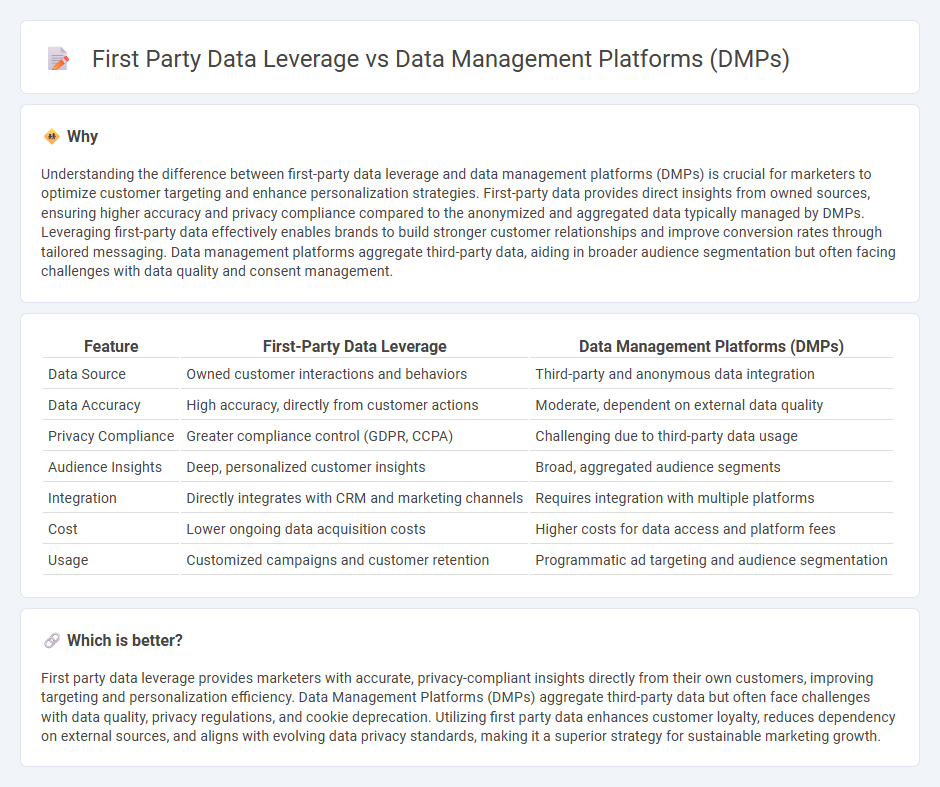
First-party data offers marketers precise insights by directly capturing customer interactions, enabling highly personalized campaigns that boost engagement and ROI. Data Management Platforms (DMPs) aggregate third-party data to broaden audience reach but often lack the accuracy and consent-driven nature of first-party data. Explore how leveraging first-party data can transform your marketing strategy for better targeting and compliance.
Why it is important
Understanding the difference between first-party data leverage and data management platforms (DMPs) is crucial for marketers to optimize customer targeting and enhance personalization strategies. First-party data provides direct insights from owned sources, ensuring higher accuracy and privacy compliance compared to the anonymized and aggregated data typically managed by DMPs. Leveraging first-party data effectively enables brands to build stronger customer relationships and improve conversion rates through tailored messaging. Data management platforms aggregate third-party data, aiding in broader audience segmentation but often facing challenges with data quality and consent management.
Comparison Table
| Feature | First-Party Data Leverage | Data Management Platforms (DMPs) |
|---|---|---|
| Data Source | Owned customer interactions and behaviors | Third-party and anonymous data integration |
| Data Accuracy | High accuracy, directly from customer actions | Moderate, dependent on external data quality |
| Privacy Compliance | Greater compliance control (GDPR, CCPA) | Challenging due to third-party data usage |
| Audience Insights | Deep, personalized customer insights | Broad, aggregated audience segments |
| Integration | Directly integrates with CRM and marketing channels | Requires integration with multiple platforms |
| Cost | Lower ongoing data acquisition costs | Higher costs for data access and platform fees |
| Usage | Customized campaigns and customer retention | Programmatic ad targeting and audience segmentation |
Which is better?
First party data leverage provides marketers with accurate, privacy-compliant insights directly from their own customers, improving targeting and personalization efficiency. Data Management Platforms (DMPs) aggregate third-party data but often face challenges with data quality, privacy regulations, and cookie deprecation. Utilizing first party data enhances customer loyalty, reduces dependency on external sources, and aligns with evolving data privacy standards, making it a superior strategy for sustainable marketing growth.
Connection
First-party data is collected directly from customers, providing accurate and personalized insights that enhance marketing strategies. Data Management Platforms (DMPs) aggregate this first-party data with other sources to create comprehensive audience profiles for targeted advertising. Leveraging first-party data within DMPs enables marketers to optimize campaign performance, improve customer segmentation, and increase return on investment (ROI).
Key Terms
Audience Segmentation
Data Management Platforms (DMPs) aggregate third-party data to create broad audience segments but often face challenges with data accuracy and privacy compliance. First-party data leverage offers more precise audience segmentation by using directly collected customer information, enhancing personalization and targeting effectiveness. Explore how integrating DMPs with first-party data can optimize audience segmentation strategies and improve marketing ROI.
Data Onboarding
Data management platforms (DMPs) aggregate third-party data to build broad audience segments, while first-party data leverage centers on onboarding proprietary customer data for precise targeting and personalization. Data onboarding transforms offline and online first-party data into actionable digital profiles, enhancing campaign accuracy and customer insights. Explore how integrating first-party data with DMP strategies maximizes marketing effectiveness.
Privacy Compliance
Data Management Platforms (DMPs) aggregate anonymized third-party data to build audience segments, whereas first-party data leverage involves directly collecting and utilizing consumer information from owned sources, enhancing privacy compliance by minimizing reliance on external data. First-party data aligns with regulations such as GDPR and CCPA by offering transparent user consent mechanisms and better control over data usage, reducing risks associated with third-party data breaches and non-compliance. Explore how integrating first-party data strategies can optimize privacy compliance and drive more effective marketing outcomes.
Source and External Links
What is a data management platform? - Acxiom - A data management platform (DMP) is a SaaS platform that collects, organises, and facilitates the activation of anonymous data for personalisation and marketing campaigns.
Data management platform - Wikipedia - A data management platform (DMP) is a software platform used for collecting and managing data to identify audience segments for targeted advertising.
What Is a Data Management Platform (DMP)? | Oracle Data Cloud - A data management platform (DMP) collects, organizes, and activates first-, second-, and third-party audience data for targeted advertising and personalization initiatives.
 dowidth.com
dowidth.com